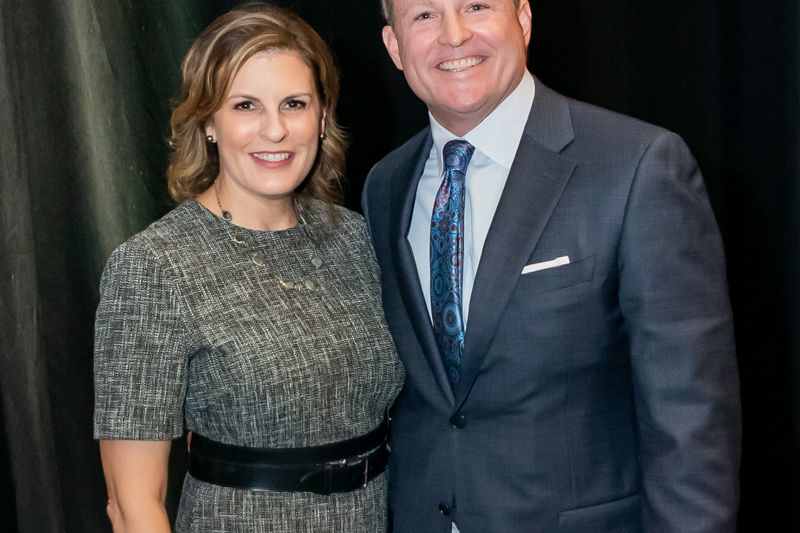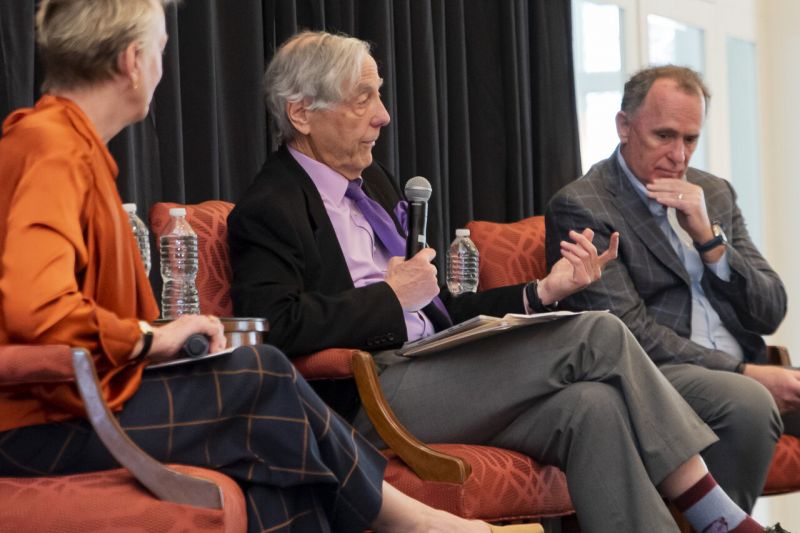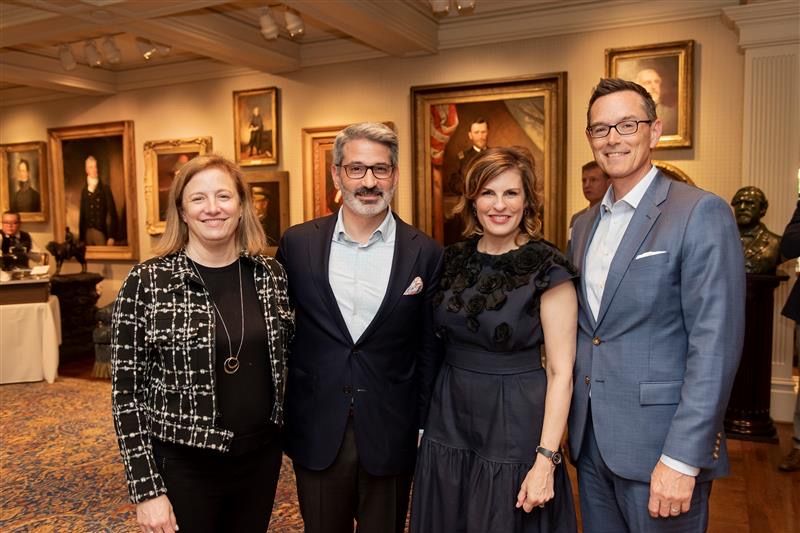Housing Availability in North Texas

On Friday, Dec 1., community leaders, philanthropists and change-seekers from across North Texas gathered to explore a topic that directly impacts hundreds of thousands of our neighbors every year: housing availability.
Hosted by the United Way of Metropolitan Dallas Ruth Sharp Altshuler Tocqueville Society and TREC Community Investors, Housing in North Texas welcomed some of the leading voices on real estate and community development in our region and examined the profound impact of housing availability on United Way’s focus areas of education, income and health.
Those in attendance included U.S. Rep. Keith Self, Dallas County Commissioner Andy Suman, and Dallas City Council members Chad West, Carla Mendelson and Jesse Moreno, as well as T.C. Broadnax, Dallas city manager, who opened the event.
“We don’t have enough housing at levels that are affordable for first-time home buyers, seniors on fixed incomes or workforce renters,” Broadnax said. He explained that earlier this year, the City of Dallas adopted a new equitable housing policy, Dallas Housing Policy 2033. “In addition to addressing the affordable housing issues, the new policy addresses the root and systemic and historical reasons for housing disparities and inequities in our city. These disparities stem from longstanding racial and economic segregation including redlining, discrimination and disinvestment hurting our neighborhoods in West and South Dallas, particularly while supporting economic development and revitalization in these neighborhoods.
Following Broadnax’s remarks, the luncheon also included a panel discussion in which our speakers explored how they are addressing the housing shortage in our region, as well as how housing helps protect good jobs, creates great schools and diverse communities, and offers unique opportunities that matter to local families. The event also gave attendees a better understanding of the concrete steps they can take to advocate for housing.
Speakers included:
- Jack Matthews, President Matthews Southwest
- Steven Bancroft, Senior Managing Director of Trammell Crow Residential
- Maggie Parker, Founder & Managing Partner of Innovan Neighborhoods
- James Craig, President/Broker of Craig International
The panel was moderated by Ashley Brundage, executive director of housing stability and senior vice president of community impact at United Way of Metropolitan Dallas.
View a video of the full event below, or read on for highlights from the Q&A.
To start off the panel, Ashley Brundage laid out the importance of housing in our region.
“Our work at United Way focuses on the building blocks of opportunity: education, income and health. We believe that stable and affordable housing is a foundational factor, playing a crucial role in shaping the overall well-being of individuals and families. We know that without a house, a child doesn’t have a quiet place to study for school; when you’re worried about where you’ll be sleeping tonight, it’s hard to maintain a job, let alone succeed in a career; and an affordable home allows families to save money to see the doctor and pay other bills.
“Cities that fail to offer affordable housing solutions will ultimately drive out residents, leading to a shortage in the workforce, an increase in negative health outcomes for its residents, and inevitably, less growth in their local economies. Unfortunately, in North Texas today, a minimum-wage worker working full time cannot afford to rent a two-bedroom apartment. Roughly half of renters in Texas’ major urban areas spend more than 30% of their income on keeping a roof over their heads. Renters are spending so much on housing that it’s crowding out other necessary household expenses like childcare, groceries and transportation—and making it more difficult for them to become homeowners.
“At the height of the state’s hot housing market last year, the median sales price in DFW soared more than 60%—growing past $400,000. The market has since cooled amid higher interest rates, but the median home price in the region is still 50% higher than it was before the pandemic. For a state that has long prided itself on the affordability of its housing, homeownership may soon be out of reach for many Texas families.”
Then, Brundage opened the panel with a question for all of our speakers.
Brundage: “Affordable housing often intersects with neighborhood development. However, few developers put affordable units in what we call well-planned developments. Can you tell us why you make a point of including affordability in some of your communities and what challenges you’ve faced?”
Maggie Parker: “If you’re spending more than 30% of your income, then your housing is not affordable to you. All of us want to have some level of affordable housing, and the range of incomes that we need within our communities is varied. We need a variety of product types. We need the luxury apartments folks who can afford that, and we need things that are on the lower spectrum as well. As I think about the work that I’m doing with Innovan Neighborhoods … how do we provide mixed-income opportunities and housing for folks in neighborhoods that are typically distressed and underserved, and how do we bring really quality products? How do we bring some of the best minds and partners into this work? I think we’re able to do that through the various partnerships that we have, whether that’s developers or local governments and community partners. For us it’s about bringing all of those different groups of people together to then move some really great deals forward. Yes, the hurdles are there and they’re going to be there because we’re kind of bucking up against the market, but I think all of us on stage would not be here if we didn’t have a passion for this work.”
Jack Matthews: “Maggie’s right. You have to have a reason for why you’re doing things and in business you might say, ‘Why isn’t there affordable housing just sitting out there as a market?’ But there’s a reason for that. You make a lot less money building affordable houses than you do luxury. The good news is a company like Steve’s is getting into it. … Generally speaking, you can’t drive a market expecting nice people to show up and make housing happen. You overlay the economics with the need. We try to put in the pieces that fit, but really need to merge with a city, with a county and make things easier.
James Craig: “We’re a family owned and operated, full-service commercial brokerage development construction consulting firm. My presence here today, I think, is a great example of how the needle can and should be moved. We can’t always depend on subsidies or different tax credits to keep moving that needle. If there were easy answers, I think we’d all be doing it. But there are creative ways: For example, the City of McKinney coming up with the McKinney Land Trust, which they’ll be using to hopefully develop affordable attainable housing. Or for example, I’m working with a nonprofit called Shiloh Place based out of McKinney, which a ministry for single mothers that are homeless or at risk of being homeless. They only have the capacity for four mothers and their children at a time. It’s a renovated home in historical McKinney. So whether that mom has three children or one child, they’re all sharing one bedroom. Today we’re in our final stages of getting site plan approval and going vertical on their new relocation and expansion, which will quadruple their capacity immediately and eventually allow for up to 50 units. In that example, there was no incentive other than it was the right thing to do, and I felt extremely passionate about the cause. As a broker, I took a FE when we closed on the land, but I rezoned the property for them and essentially am developing it with them, bringing third parties to the table that have that philanthropic heart as well. So at the end of the day, there’s more than one way to spin the coin, and we’re going to need that whole collective in order to make a drop in the bucket. I think as it was said earlier, North Texas has always been able to hang our hat on affordability and quality of life. I think if we lose that, we lose our identity. And so that’s why I’m here today.”
Brundage: “What can individuals do to encourage greater supply of attainable housing?”
Bancroft: “I think we need to be housing advocates with your city council members, with your NIMBY neighborhoods. Listen, I lived in Frisco for 20 years. I love Frisco by the way, but they don’t want a lot of development up there. I don’t know if that’s going to change, but you’ve got to be upfront and allow the (affordable) residential to come to your neighborhood. The United States needs 1.7 million homes per year to be built. Guess how many times in the last 25 years there’s been 1.7 million housing units built? Zero. That’s why we have a shortage of 1.8 million homes across the country. We need to open up the conversation a little bit further beyond just city council.”
Parker: “I think your point around people getting engaged and being advocates is huge, and I don’t want to underestimate what that does for projects. When you show up to a community meeting, when you show up to planning sessions that your city planners or council members are hosting, etc., that makes a huge difference because most people who show up are the naysayers. They’re the people who don’t want the affordable housing project, even though you’ve put all the whole capital stack together to potentially get that. But to be an advocate, yes, at the corporate level, yes, as we have conversations with our city councilmen. It’s also in those neighborhood meetings, the HOA meetings that maybe everybody doesn’t want to go to, but it is super important to help get projects across the finish line.”
Craig: “What we have always said is that, as the developer, it’s our responsibility to educate the residents. There’s always going to be a ton of misinformation out there, whether it’s the crime rates or that your police force is taxed more than they normally would be because of all the calls going to one development. Well, yeah, there’s 600 people in that development versus one family in every single-family detached home. So most of the time what I have found is we do a whole community outreach and engagement program when we’re trying to rezone a property.
“It’s sad that you have to go that far above and beyond in order to get some attainable housing on the ground. But the one thing that I will say that’s been a pleasant surprise is watching the evolution of understanding attainable housing and why it’s important. … At first it was a lot of, ‘Yeah, we need workforce housing, we need attainable housing, but not in my backyard.’ And you’ve seen over time as they’re educated: Here are 10 examples of single-family detached homes that were right next to new multifamily developments. And you’ll see right here that property values are going up every year, not the reverse. So I think that the more we talk about it, the more that we clear up any misunderstandings or miscommunication as it relates to the product. The more we continue having the dialogue, I think the better off we’ll be.”
Become a Tocqueville Society Member
The United Way of Metropolitan Dallas Ruth Sharp Altshuler Tocqueville Society recognizes a select group of change-makers with an unsurpassed dedication to achieving lasting results in our community. Named to honor the late Ruth Sharp Altshuler, a longtime Dallas philanthropist, the Tocqueville Society is comprised of civic and business leaders whose vision for North Texas is matched only by their generosity. Members enjoy exclusive Tocqueville events, advocacy and volunteer opportunities, family engagement and more.
Now is a wonderful time to join the Tocqueville Society, as United Way continues the march toward our Centennial year and our second century of service to the North Texas community.
As Michelle Horton, chair of the Women of Tocqueville and partner at PwC, said during the event, “It’s a great time to get involved. … United Way is a leader of leaders among the community and bringing together North Texas business and philanthropic community.”
Visit the Tocqueville Society webpage for more information about becoming a member.
Tags

Support Housing Availability in North Texas
Together, we can ensure all North Texans have the opportunity and access to achieve housing stability. Click below to make an investment in the future of our community today.


